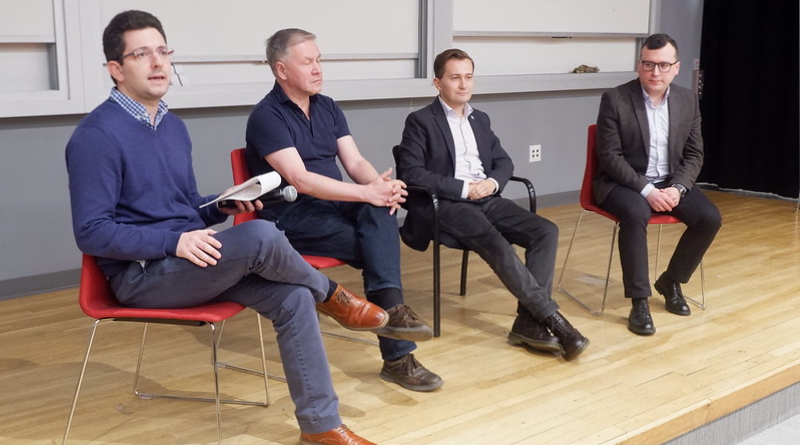Assessing the Legacy of Alexei Navalny
By Natasha Wood, MALD Candidate 2024, The Fletcher School
On March 5, 2024, the Fletcher Russia and Eurasia Program hosted a film screening of the documentary “Navalny” (2022) and an expert panel conversation about the legacy that Russian opposition politician Alexei Navalny left behind. The panelists included Sergei Erofeev, Pavel Luzin, and Yury Terekhov, all of whom had personal experiences interacting with Navalny and his team and studying the Russian opposition. The event was held in collaboration with the Jonathan M. Tisch College of Civic Life and Amnesty International.
“Navalny” traces the life and work of the late Navalny, who died in a Russian penal colony in February 2024. The documentary focuses on the FSB’s attempt to poison him in 2020 using the nerve agent Novichok and his decision to return to Russia in January 2021.
In one particularly impressive scene, Navalny and his team, in cooperation with investigative research firm Bellingcat, document on camera the moment they duped FSB agent Konstantin Kudryavtsev into discussing the details of Navalny’s poisoning. Posing as an official in Russia’s National Security Council, Navalny calls several of his alleged attackers urging them to debrief the poisoning mission and explain why it failed. Kudryavstev confirmed that Novichok had been applied to Navalny’s underpants and that he had gone to Omsk after the operation to try and clear up any evidence.
Kudryavstev also confirmed that had the flight Navalny was on from Tomsk to Moscow not been diverted to Omsk, where Navalny received emergency treatment, Navalny almost certainly would have died. The video that Navalny’s team subsequently published documenting the call with Kudryavtsev got 7.7 million views in 7 hours.
Following the viewing, the panelists kicked off with a discussion on the implications of Navalny’s death on the Russian political system. “This death creates a new political reality in Russia,” said Luzin, a Fletcher visiting scholar who consulted for Navalny’s presidential campaign in 2017-2018. “Before Navalny’s death, there was a small hope that some reform was possible—reforming without blood, reforming without awful turbulence inside of Russia, even in current circumstances. But after Navalny’s death, I presume this is impossible. I presume Russia will go directly through a bloody civil war because there is no other probable scenario.”
Erofeev, a lecturer at Rutgers University and former Vice-Rector for International Affairs at the National Research University Higher School of Economics in Moscow, discussed Navalny’s legacy in the context of Russian democratic development. He reminded attendees that many developed democracies, including the United States, have had to overcome major domestic turmoil that challenged the growth of a democratic system.
“We look back and we tend to think that countries [with developed democracies] just easily achieved this stage of democracy. This is an illusion. When we look at Russia, some think it’s all so hard and impossible, and Russians are inherently imperialistic,” Erofeev said. “Russia has to go through very hard times. But Navalny’s example [shows that Russians] are not just outcasts, we are not just slaves, we are not just imperialists, we are like you.”
Insinuating that the future development of democracy in Russia will mirror democratic development in the United States is probably misguided: Russia has a unique history and different challenges. But Navalny certainly offered a drastically different path for Russia. “Navalny was the first politician in contemporary Russia,” suggested Arik Burakovsky, Assistant Director of the Fletcher Russia and Eurasia Program. “He pioneered crowdfunding and American-style political campaigns in Russia. He consistently worked with the media, created the strategy of smart voting, and used social media to publicize his anti-corruption campaigns—that was incredibly innovative for Russia.”


